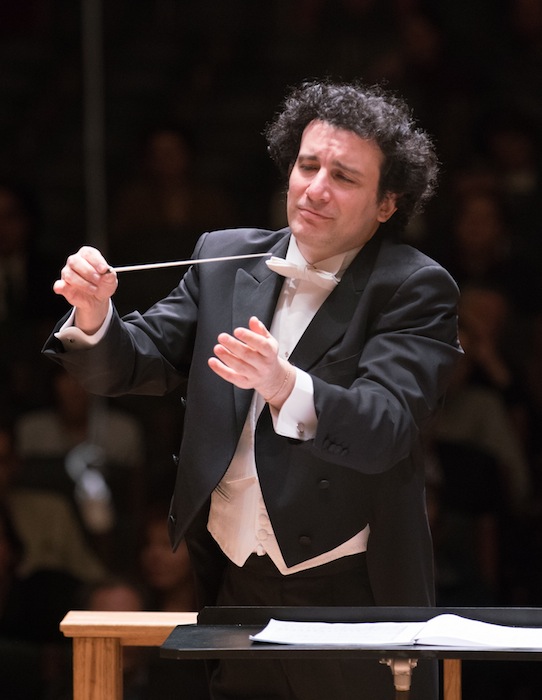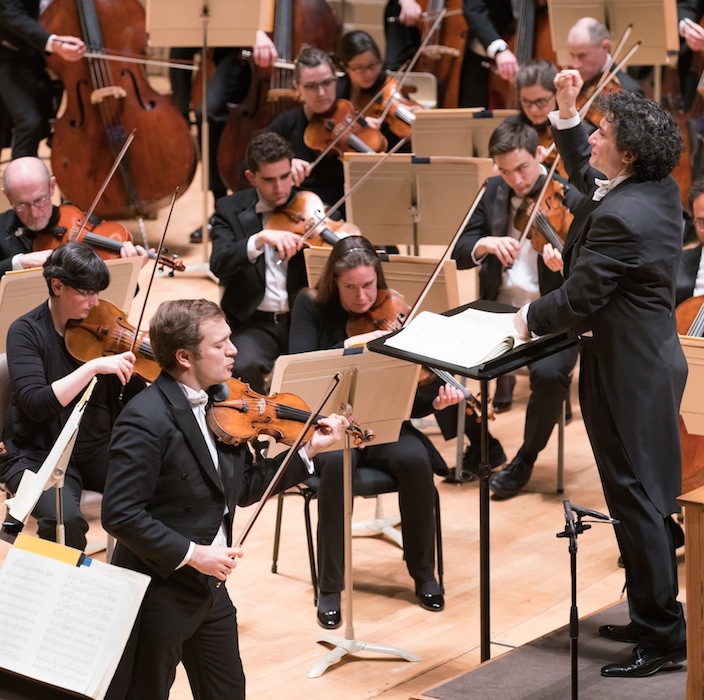BSO’s French heritage on full display with Altinoglu’s impressive debut

Alain Altinoglu conducted the Boston Symphony Orchestra in a French program Wednesday night. Photo: Michael Blanchard
Henri Dutilleux is a solitary figure in musical history. Amid the polemical factions that emerged among composers after World War II, the French composer incorporated styles from both conservative and avant-garde trends without adhering strictly to either side. His music, as with the man, stands for itself.
The Boston Symphony Orchestra was an early champion of Dutilleux’s, having commissioned and premiered a number of works over the past five decades. Among those is the composer’s Symphony No. 2, which Charles Munch and the orchestra first performed in 1959.
Since then, however, the work has been little played, turning up on BSO programs only three times since 1995. Wednesday night, as part of an all-French program led by Alain Altinoglu in an impressive BSO debut, the piece made a memorable return to Symphony Hall.
Subtitled Le double, Dutilleux’s symphony weaves two ensembles into a continuous dialogue. The large group provides a sonic backdrop upon which a small band of twelve instruments paint vivid colors. The music unfolds in echoes. Restless figures originating in the chamber ensemble seem to flutter outwards into the larger orchestra, where they are stretched and compressed.
Dutilleux’s writing is uniquely colorful. His orchestration and harmonic language resemble Debussy. But the piece is shot through with a driving rhythm that recalls the power and precision of Bartók. In the first of the piece’s three movements, phrases coalesce into beams of sound before breaking into dexterous runs. Altinoglu took the music at a brisk pace, and the figures seemed to dance with silvery delicacy.
The final movement opens in a frenzy. Darting figures are interrupted by jazzy shouts in the brass. When the music quiets down, instrumental colors slowly transform like light through a turning prism. The second movement is gorgeous, with deep, stirring basses passing phrases off to solo viola and violin. Altinoglu wove a silky bed of sound from the orchestra, delivering a gripping performance of a work that should be heard more often.
The solo spotlight of the evening fell upon violinist Renaud Capuçon, who performed a rapt rendition of Lalo’s Symphonie espagnole.

Renaud Capuçon performed Lalo’s “Symphonie espagnole” with Alain Altinoglu and the BSO Wednesday night. Photo: Michael Blanchard
A concerto in all but name, Lalo’s barnstorming work remains one of the most exciting solo pieces in the repertoire. Capuçon, playing with a burnished tone, was in full command of the piece’s gnarly passagework. In the fast movements, the figures took him all over his instrument’s fingerboard. The final movement, with its wild gypsy flourishes, had a rustic verve, and the Scherzando was a whirling dance. In all, Capuçon’s technique and precision were jaw-dropping.
Capuçon found the poetic sides of the work in the slow movements, his tone taking on bright, gleaming colors in the music’s wide leaps. Altinoglu led a zesty accompaniment that was ripe with Spanish flavor. The BSO strings and winds made fine contrasts in the Intermezzo, coloring the musical canvas with both dark, dusky phrases and delicate brushes of sound.
Rounding out the program were equally colorful works by Berlioz and Roussel.
Roussel’s Bacchus et Ariane Suite No. 2 has long been a favorite of the BSO. With its tuneful melodies and rich textures, it’s easy to hear why.
Works such as this one are prime territory for young conductors like Altinoglu, who revel in the fine details of the music. He found the haunting beauty of the opening, where violist Steven Ansell and concertmaster Malcolm Lowe traded richly lyrical phrases. In the quick passages, the conductor built the music into lines of swirling intensity, the music never losing its bold color. The movements took on increased energy as they passed, with the final Bacchanal culminating in powerful climaxes.
Berlioz’s Roman Carnival Overture, which opened the concert, had just as much energy and thrust. Leading with waving gestures, Altinoglu wove the principal theme with tender care. His reading, too, brought out parts of the work not normally heard, such as the cello line, which Altinoglu wove softly into the violin phrases. In the quick sections of the piece, he drew playing of buoyant intensity. Altinoglu is a musician with energetic presence on the podium, aand should be welcomed back soon to Symphony Hall.
The program will be repeated 8 p.m. Thursday, Friday, and Saturday at Symphony Hall. The Dutilleux will not be performed Friday. bso.org; 888-266-1200
Posted in Performances